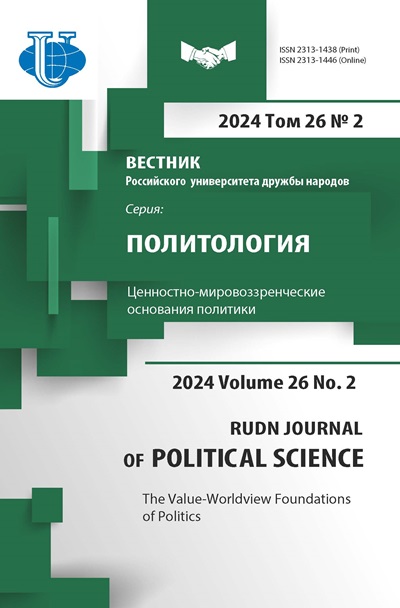Axiological foundations of Russian statehood: freedom and truth in the ideological and political discourse of the 11-17th centuries
- Authors: Strakhov A.B.1,2, Boronin A.R.2
-
Affiliations:
- State Academic University for Humanities
- Lomonosov Moscow State University
- Issue: Vol 26, No 2 (2024): The Value-Worldview Foundations of Politics
- Pages: 263-276
- Section: SEMANTIC POLICY GUIDELINES: IDEAS, CONCEPTS, THEORIES
- URL: https://journals.rudn.ru/political-science/article/view/39754
- DOI: https://doi.org/10.22363/2313-1438-2024-26-2-263-276
- EDN: https://elibrary.ru/NMSUTM
Cite item
Full Text
Abstract
The concepts of truth and freedom, being important value categories for modern Russian citizens, have deep historical roots. Therefore, it is important to consider their historical content and evolution. In this regard, the purpose of the article is to reconstruct the meaning of truth and freedom as value categories. The main conclusions of the article were made during the study of the works of Russian authors of the 11-17th centuries on the basis of the search database of the National Corpus of the Russian language. As a result of the content analysis and comparative analysis, the following conclusions were drawn. Both of these concepts, having, at first glance, a large number of different meanings, are determined primarily by the Orthodox Christian content, which makes it possible to reconstruct their unified commonly used definition. The concept of freedom in the texts of the 11-17th centuries in many ways resembled its modern usage and was associated with the political independence of the state or people, however, in a fair part of the documents there was an understanding of freedom as a Christian gift, in many ways resembling the understanding of grace and salvation. The concept of freedom was filled with the Christian understanding of freedom from death, from sin and God’s wrath, thus defining the necessary practice of exercising freedom itself. The concept of truth, which in modern science is either reduced to a narrow understanding as law or justice, or breaks up into a significant number of autonomous concepts, was also determined precisely by the Christian content. Undoubtedly being an attribute of power relations, truth is deduced from the human dimension, and its bearer is not an abstract or specific prince, not a specific secular or spiritual ruler, but the Lord God. Both private life and public administration, obeying the demands of truth, lead to the establishment of Divine institutions on earth and the salvation of both an individual and an entire nation.
About the authors
Aleksandr B. Strakhov
State Academic University for Humanities; Lomonosov Moscow State University
Author for correspondence.
Email: falconian@yandex.ru
ORCID iD: 0000-0003-4663-7739
PhD in Political Science, Leading Researcher of the Scientific and Design Department of the Scientific and Innovative Management, State Academic University of Humanities; Specialist in Educational and Methodical work of Department of History of Social and Political Doctrines, Faculty of Political Science, Lomonosov Moscow State University
Moscow, Russian FederationArtyom R. Boronin
Lomonosov Moscow State University
Email: boronin.artemm@gmail.com
Student of Department of History of Social and Political Doctrines, Faculty of Political Science Moscow, Russian Federation
References
- Evgenieva, T.V., & Evgeniev, V.A. (2023). Political Perceptions and Values of the Russian Youth in the Context of Their Historical and Cultural Foundations. Humanities and Social Sciences. Bulletin of the Financial University, 3, 94–100. (In Russian). http://doi. org/10.26794/2226-7867-2023-13-3-94-100
- Evgenieva, T.V., Selezneva, A.V., Skipin, N.S., & Tulegenova, D.D. (2023). Request for paternalism: The idea and value of the state in the minds of Russian youth. RUDN Journal of Political Science, 25(1), 233–251. http://doi.org/10.22363/2313-1438-2023-25-1-233-251
- Perevezentsev, S.V., & Ananyev, D.A. (2023). Axiological foundations of Russian statehood: “Truth” and “justice” in the domestic ideological and political discourse. RUDN Journal of Political Science, 25(1), 21–37. (In Russian). http://doi.org/10.22363/2313-1438-2023-25-1-21-37
- Perevezentsev, S.V., Puchnina, O.E., Strakhov, A.B., & Shakirova, A.A. (2021с). “The Fatherland is not in geography…”: On the issue of the evolution of traditional spiritual and political values of Russian civilization. Essays on Conservatism, 3, 263–283. http://doi.org/10.24030/24092517-2021-0-3-245-262
- Perevezentsev, S.V., Puchnina, O.E., Strakhov A.B., & Shakirova, A.A. (2021b). On the methodological principles of studying Russian basic traditional values. Moscow State University Bulletin. Series 18. Sociology and Political Science. Vol. 27, no. 4. pp. 113–133. (In Russian).
- Perevezentsev, S.V., Puchnina, O.E., Strakhov, A.B., Shakirova, A.A. (2021a). “We rule from the great Rurik…”: On the issue of the formation of a single spiritual-political axiological complex “Russian land — Russian state — Russian kingdom”. Essays on Conservatism, 3, 245–262. (In Russian).
- Perevezentsev, S.V., & Sorokopudova, O.E. (2022). Peter I as a political thinker: Traditional values and ideological innovations. The journal Moscow University Bulletin. Series 12. Political Science, 3, 50–73. (In Russian).
- Petukhov, V.V. (2011). The value palette of modern Russian society: “Ideological mess” or the search for new meanings? Monitoring of Public Opinion, 1(101), 6–23. (In Russian).
- Pravda:, Discourses of justice in Russian Intellectual history. (2011). Moscow: Klyuch-S. (In Russian).
- Savelyev, V.S. (2012). Dictionary. In M.L. Remneva & et al. (Eds.), The Old Slavonic Language (pp. 594–670). Moscow: Moscow University Press. (In Russian).
- Selezneva, A.V., Skipin, N.S., & Turkov, E.A. (2023). Value-semantic dominants of political morality of Russian youth: Political-psychological analysis. Bulletin of Perm University. Political Science, 2, 60–70. (In Russian). http://doi.org/10.17072/2218-1067-2023-2-60-70
- Selezneva, A.V. (2022). Political morality of modern Russian youth: Values, ideas, attitudes. Research Result. Sociology and management, 3, 47–60. (In Russian). http://doi.org/10.18413/2408-9338-2022-8-3-0-4
- Selishchev, A.M. (1952). Old Slavonic language. Part 2: Texts. Dictionary. Essays on morphology. Moscow: Uchpedgiz. (In Russian).
- Shestopal, E.B. (2011). Representations, images and values of democracy in Russian society. Politeia, 3(62), 34–47. (In Russian). http://doi.org/10.30570/2078-5089-2011-62-3-34-47
- Sorokopudova, O.E., & Mironov, D.V. (2023). Study of the axiological foundations of Russian statehood: Prospects for using the method of political-textological analysis. RUDN Journal of Political Science, 2, 455–470. (In Russian). http://doi.org/10.22363/2313-1438-2023-25-2-455-470
















